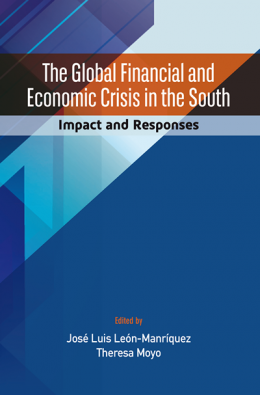The Global Financial and Economic Crisis in the South: Impact and Responses: Impact and Responses
Keywords:
Global Financial, Economic, South, Impact, ResponsesSynopsis
This book is the outcome of a South-South conference jointly organized by the Asian Political and International Studies Association (APISA), the Latin American Council of Social Sciences (CLACSO) and the Council for the Development of Social Science Research in Africa (CODESRIA) in Dakar, Senegal, May 2012. The conference was organised in response to the financial crisis of 2008 which started in the United States and Europe, with reverberating effects on a global scale.
Economic problems emanating from such crises usually leave major social and structural impacts on important sectors of the society internationally. They affect living standards and constrain the well-being of people, especially in poor countries. Persistent problems include high unemployment, increased debt and low growth in developed countries, as well as greater difficulties in accessing finance for investment in the developing world.
There is a need for countries in the South to examine the available options for appropriate national and regional responses to the different problems emanating from the economic crisis. This book attempts to provide ideas on some strategic responses to the disastrous impact of the crisis, while keeping in mind the global common interest of the South.
It is hoped that the book will contribute significantly towards the agenda to rethink development and the quest for alternative paradigms for a just, stable and equitable global political, economic and social system. A system in which Africa, Asia, and Latin America are emancipated from the shackles of hegemonic and anachronistic neoliberal dictates that have nothing more to offer than crises, vulnerabilities and dependency.
Chapters
-
The Global Financial and Economic Crisis in the SouthImpact and Responses
-
The Global Financial and Economic Crisis:Origins, Effects and Responses in the Global South – An Overview
-
The Financial Crisis, its Diverse Economic Effects and Responses from Latin America: A Global Crisis?
-
All Keynesian Now? Mexico and South Korea’s Diverging Responses to the Global Crisis
-
The Global Crisis and the Arrival of the People’s Republic of China in Latin America and the Caribbean
-
African Stock Exchanges: Does Integration with the Global South Reduce Susceptibility to Financial Crisis?
-
Global Economic Crisis and South Africa’s Manufacturing Industry: The Case of the Automotive, Textile and Clothing, and Mining Industries
-
Analysis of the Effects of the Global Financial Crisis and Government Measures: The Case of the Timber Industry in Congo, Cameroon and Gabon
-
The Impact of the Financial Crisis: Developments in the Mobile Telecommunications Industry in Africa
-
Shoot Yourself in the Foot: Philippine State and Society in the 1997 and 2008 Financial Crises
-
Global Economic Crisis and Insecurity in Afghanistan, Pakistan and Tajikistan
-
Accountability in Public-Private Partnerships: The Emerging Development Paradigm in India amidst Financial Crisis
-
Chinese Social Transformation and its Implications for the Future of Afro-Asian Solidarity
-
The Global Financial and Economic Crisis and the South: What Have We Learned and Where Do We Go from Here?
-
The Global Financial and Economic Crisis in the SouthImpact and Responses
Downloads






